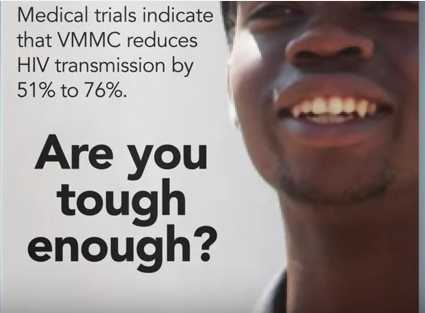
IRIS login | Reed College home Volume 96, No. 2: June 2017
The Economics of the Big Cut
It’s quick, it’s painless, it’s free, and it cuts HIV infection in men by up to 60%.
Voluntary medical male circumcision (VMMC) is a powerful tool for combating HIV in areas with high prevalence rates of the virus, according to the World Health Organization.
Nonetheless, men aren’t typically pounding down the door to get the operation. So government agencies, health workers, and NGOs in South Africa are trying to find ways to encourage more men to undergo the procedure.
Prof. Nick Wilson ’99 [economics 2013–] and Willa Friedman from the University of Houston won a grant from 3ie and worked with the Centre for HIV and AIDS Prevention Studies (CHAPS) to test different approaches to encourage men to get circumcised. They handed out three types of postcards to men in a Johannesburg neighborhood. The postcards all contained basic information about the benefits of circumcision, but featured different headlines.
One made an appeal to men’s masculinity: “Are You Tough Enough?”
Another postcard focused on their partners. “2 out of 3 partners of uncircumcised men would prefer that their partner be circumcised.”
A third contained just the basic information on circumcision.
Wilson and Friedman then created another set of postcards containing the same three types of messages, but with an added economic incentive of R100 (US$6.69) for simply walking into a clinic to discuss circumcision with a health worker.
The researchers found that the messages appealing to masculinity and partners were both fairly effective at encouraging men to get circumcised. But the single most effective technique was the seven-dollar compensation—even though it was a modest amount, and even though men could get the money and leave the clinic without actually undergoing the procedure.
“Why did they not take the money and leave?” asks Prof. Wilson. “Why was it so effective at bringing people in?”
People generally don’t do a good job taking preventive steps to protect their health, Wilson says. We tend to put off things that are inconvenient or involve mild discomfort, he says, even when we know they are good for us. Yet economists have struggled to formulate a systematic approach to this kind of behavior.
“We don’t have a formal model of procrastination,” he said.
Wilson’s professional research focuses on fundamental puzzles about human behavior, such as encouraging people to invest in preventive health and reduce procrastination.
CHAPS hopes that the findings trickle upward and influence policymakers in African nations affected by the spread of HIV/AIDS. The effectiveness of these postcards may yet prove a better tool for persuading people than a billboard or a conventional public information campaign.
The full report of the experiment will appear as "Advertising for Demand Creation for Voluntary Medical Male Circumcision" in a forthcoming edition of the Journal of Acquired Immune Deficiency Syndromes.
Tags: economics, research, professors



LATEST COMMENTS
steve-jobs-1976 I knew Steve Jobs when he was on the second floor of Quincy. (Fall...
Utnapishtim - 2 weeks ago
Prof. Mason Drukman [political science 1964–70] This is gold, pure gold. God bless, Prof. Drukman.
puredog - 1 month ago
virginia-davis-1965 Such a good friend & compatriot in the day of Satyricon...
czarchasm - 4 months ago
John Peara Baba 1990 John died of a broken heart from losing his mom and then his...
kodachrome - 7 months ago
Carol Sawyer 1962 Who wrote this obit? I'm writing something about Carol Sawyer...
MsLaurie Pepper - 8 months ago
William W. Wissman MAT 1969 ...and THREE sisters. Sabra, the oldest, Mary, the middle, and...
riclf - 10 months ago